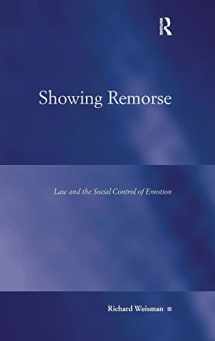
Showing Remorse: Law and the Social Control of Emotion (Law, Justice and Power)
ISBN-13:
9780754673989
ISBN-10:
0754673987
Edition:
1
Author:
Richard Weisman
Publication date:
2014
Publisher:
Routledge
Format:
Hardcover
158 pages
FREE US shipping
Book details
ISBN-13:
9780754673989
ISBN-10:
0754673987
Edition:
1
Author:
Richard Weisman
Publication date:
2014
Publisher:
Routledge
Format:
Hardcover
158 pages
Summary
Showing Remorse: Law and the Social Control of Emotion (Law, Justice and Power) (ISBN-13: 9780754673989 and ISBN-10: 0754673987), written by authors
Richard Weisman, was published by Routledge in 2014.
With an overall rating of 3.5 stars, it's a notable title among other
books. You can easily purchase or rent Showing Remorse: Law and the Social Control of Emotion (Law, Justice and Power) (Hardcover) from BooksRun,
along with many other new and used
books
and textbooks.
And, if you're looking to sell your copy, our current buyback offer is $0.31.
Description
Whether or not wrongdoers show remorse and how they show remorse are matters that attract great interest both in law and in popular culture. In capital trials in the United States, it can be a question of life or death whether a jury believes that a wrongdoer showed remorse. And in wrongdoings that capture the popular imagination, public attention focuses not only on the act but on whether the perpetrator feels remorse for what they did. But who decides when remorse should be shown or not shown and whether it is genuine or not genuine? In contrast to previous academic studies on the subject, the primary focus of this work is not on whether the wrongdoer meets these expectations over how and when remorse should be shown but on how the community reacts when these expectations are met or not met. Using examples drawn from Canada, the United States, and South Africa, the author demonstrates that the showing of remorse is a site of negotiation and contention between groups who differ about when it is to be expressed and how it is to be expressed. The book illustrates these points by looking at cases about which there was conflict over whether the wrongdoer should show remorse or whether the feelings that were shown were sincere. Building on the earlier analysis, the author shows that the process of deciding when and how remorse should be expressed contributes to the moral ordering of society as a whole. This book will be of interest to those in the fields of sociology, law, law and society, and criminology.


We would LOVE it if you could help us and other readers by reviewing the book
Book review

Congratulations! We have received your book review.
{user}
{createdAt}
by {truncated_author}


